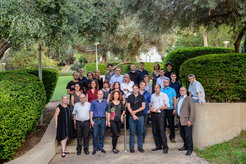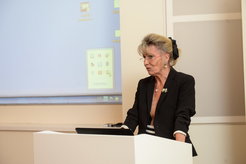Minerva Fellowship Meeting at the Weizmann Institute of Science (Rehovot)
The Minerva Fellowship Committee and the German Fellows in Israel met up at Rehovot to hear and discuss the research projects presented by three Fellowship holders

The Minerva Fellowship Committee and the German Minerva Fellows in Israel participated in the annual Minerva Fellowship Meeting at the Weizmann Institute of Science in Rehovot (Israel).
In her welcome address, the Minerva Managing Director and Max Planck Vice President Prof. Angela D. Friederici highlighted the importance of the Minerva Stiftung for supporting junior scientist both financial and in terms of cultural exchange. Afterwards, the head of the Minerva Fellowship Committee, Stefan Offermanns (Max Planck Institute for Heart and Lung Research) greeted the Fellows, thanked the Committee for its work and introduced the speakers of the symposium. Three current Fellowship Holders presented their research topic to the audience: Krister Kowalski, Lorenz Adlung and Anna Pollmann.

The PhD project of Krister Kowalski (Tel Aviv University) deals primarily with the application of modern computer assisted analyses of geographical data in an archaeological settlement study. Since most archaeological data is also geographical data, geographic information systems (GIS) are becoming increasingly important in the field to conduct these analyses. With the determination of the path of ancient roads between archaeological sites (Least-Cost-Analyses) and the prediction of the location of previously unknown sites (Predictive Site Location Modelling), Mr Kowalski presented two examples of how GIS is used in his thesis.
The Minerva Fellow Lorenz Adlung (Weizmann Institute of Science) focusses in his postdoctoral research on fundamental questions about the immune system orchestrating the host's metabolism in health and disease. In his talk, he outlined his approach to study the dynamic regulation of individual immune cells in fat depots and their contribution to the metabolic syndrome. The single-cell based analysis yielded the discovery of molecules, which could serve as targets for a rational intervention into the obesity pandemic.
Anna Pollmann (Hebrew University of Jerusalem) was introducing her Post Doc research on the intellectual milieu of the Vietnam War Crimes Tribunals from 1966/67. The Tribunal saw its aim in fulfilling the universal claim of the Nuremberg principles and in establishing new categories in international law such as crimes against humanity and genocide permanently. The focus of her research project is the transformation of juridical concepts in the political sphere of the 1960s.
Afterwards, the Minerva Fellows were invited to join the Committee at the Presidential Dinner at the Weizmann Institute.













